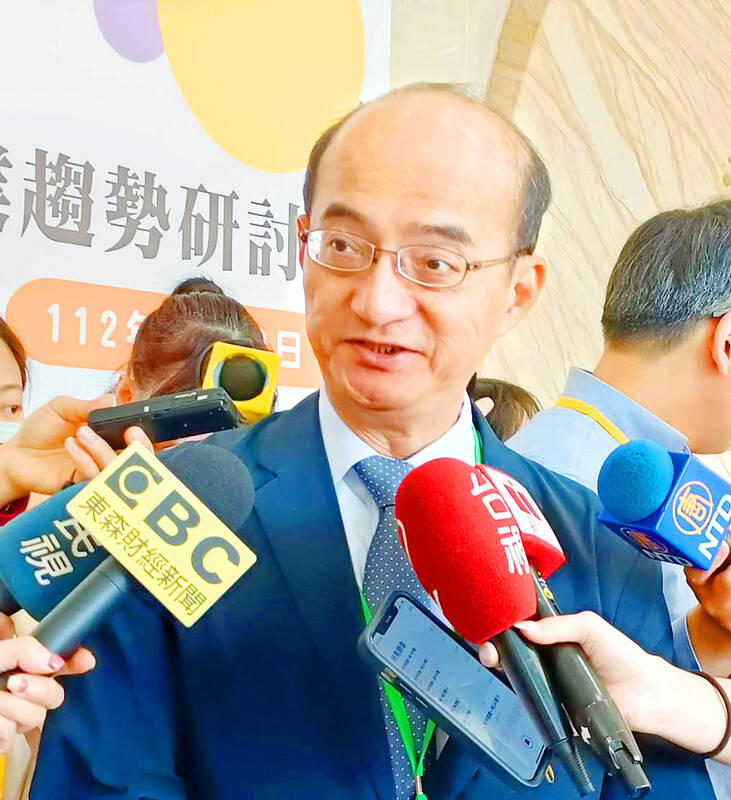The Taiwan Institute of Economic Research (TIER, 台灣經濟研究院) yesterday trimmed its forecast for Taiwan’s GDP growth this year from 1.66 percent to 1.43 percent, but is looking at a much faster expansion of 3.15 percent for next year.
The revisions have much to do with exports and private investment, two critical GDP components that weigh on the economy amid a global slowdown, but which might regain traction after several quarters of inventory adjustments, the Taipei-based think tank said.
The 3.15 percent pickup represents an increase of 1.72 percentage points from its previous prediction in July. Exports, equivalent to 60 percent of GDP, could turn positive with growth of 6.05 percent this quarter and accelerate by double-digit percentage points in the first half of next year before moderating in the second half, TIER said.

Photo: Lee Chin-hui, Taipei Times
The turnaround came after the US, the main end-market of technology products, dodged a recession this year because its people are willing to live on borrowed money despite high interest rates, TIER economist Gordon Sun (孫明德) said.
That explained why US credit card debt in the second quarter climbed more than US$1.7 trillion, but it remains to be seen if the spending spree is sustainable and can support private consumption next year, Sun said.
Inventory adjustments are coming to an end for smartphones and personal computers, while avid investment in artificial intelligence should bolster demand for semiconductors, he said.
Exports of goods and services would gain 5.03 percent next year, while imports would rise 5.44 percent, meaning an addition of 8.31 percentage points and 7.68 percentage points from projections for this year, the institute said.
Private investment would rise 3.66 percent, in stark contrast with a projected decline of 7.29 percent this year, as order visibility would improve and firms would be more interested in investment and capacity expansion, it said.
Furthermore, companies and organizations would speed up spending on development of green energy to support net zero carbon emissions goals, it said.
Private consumption would grow 2.54 percent, slowing from an expected 7.73 percent increase for this year, as revenge spending would lose steam, the institute said.
Inflation would moderate to 1.8 percent, from 2.25 percent this year, as the base effect would taper off, it said.
Geopolitical tensions would remain the biggest uncertainty, as technology competition between the US and China would carry on and military conflicts in the Middle East and between Russia and Ukraine continue, Sun said.
The global economy, including Taiwan, is expected to see a “U-shaped” trend, with the bottom likely to last longer than expected, TIER president Chang Chien-yi (張建一) said.
As a result, a comprehensive recovery in the global economy would not come until the first half of next year, which would still depend on whether international demand picks up and how global inflation pans out, Chang said.
In addition, US interest rates are likely to stay high for a longer period and any rate cuts are unlikely to come in the near term, he said.
The high interest rate environment would affect consumption, thereby weakening global trade momentum, he added.
TIER researcher Arisa Liu (劉佩真) said Taiwan should also watch out for potential competition from Southeast Asia, as India and Singapore are building their own semiconductor parks.

The US dollar was trading at NT$29.7 at 10am today on the Taipei Foreign Exchange, as the New Taiwan dollar gained NT$1.364 from the previous close last week. The NT dollar continued to rise today, after surging 3.07 percent on Friday. After opening at NT$30.91, the NT dollar gained more than NT$1 in just 15 minutes, briefly passing the NT$30 mark. Before the US Department of the Treasury's semi-annual currency report came out, expectations that the NT dollar would keep rising were already building. The NT dollar on Friday closed at NT$31.064, up by NT$0.953 — a 3.07 percent single-day gain. Today,

‘SHORT TERM’: The local currency would likely remain strong in the near term, driven by anticipated US trade pressure, capital inflows and expectations of a US Fed rate cut The US dollar is expected to fall below NT$30 in the near term, as traders anticipate increased pressure from Washington for Taiwan to allow the New Taiwan dollar to appreciate, Cathay United Bank (國泰世華銀行) chief economist Lin Chi-chao (林啟超) said. Following a sharp drop in the greenback against the NT dollar on Friday, Lin told the Central News Agency that the local currency is likely to remain strong in the short term, driven in part by market psychology surrounding anticipated US policy pressure. On Friday, the US dollar fell NT$0.953, or 3.07 percent, closing at NT$31.064 — its lowest level since Jan.

The New Taiwan dollar and Taiwanese stocks surged on signs that trade tensions between the world’s top two economies might start easing and as US tech earnings boosted the outlook of the nation’s semiconductor exports. The NT dollar strengthened as much as 3.8 percent versus the US dollar to 30.815, the biggest intraday gain since January 2011, closing at NT$31.064. The benchmark TAIEX jumped 2.73 percent to outperform the region’s equity gauges. Outlook for global trade improved after China said it is assessing possible trade talks with the US, providing a boost for the nation’s currency and shares. As the NT dollar

The Financial Supervisory Commission (FSC) yesterday met with some of the nation’s largest insurance companies as a skyrocketing New Taiwan dollar piles pressure on their hundreds of billions of dollars in US bond investments. The commission has asked some life insurance firms, among the biggest Asian holders of US debt, to discuss how the rapidly strengthening NT dollar has impacted their operations, people familiar with the matter said. The meeting took place as the NT dollar jumped as much as 5 percent yesterday, its biggest intraday gain in more than three decades. The local currency surged as exporters rushed to